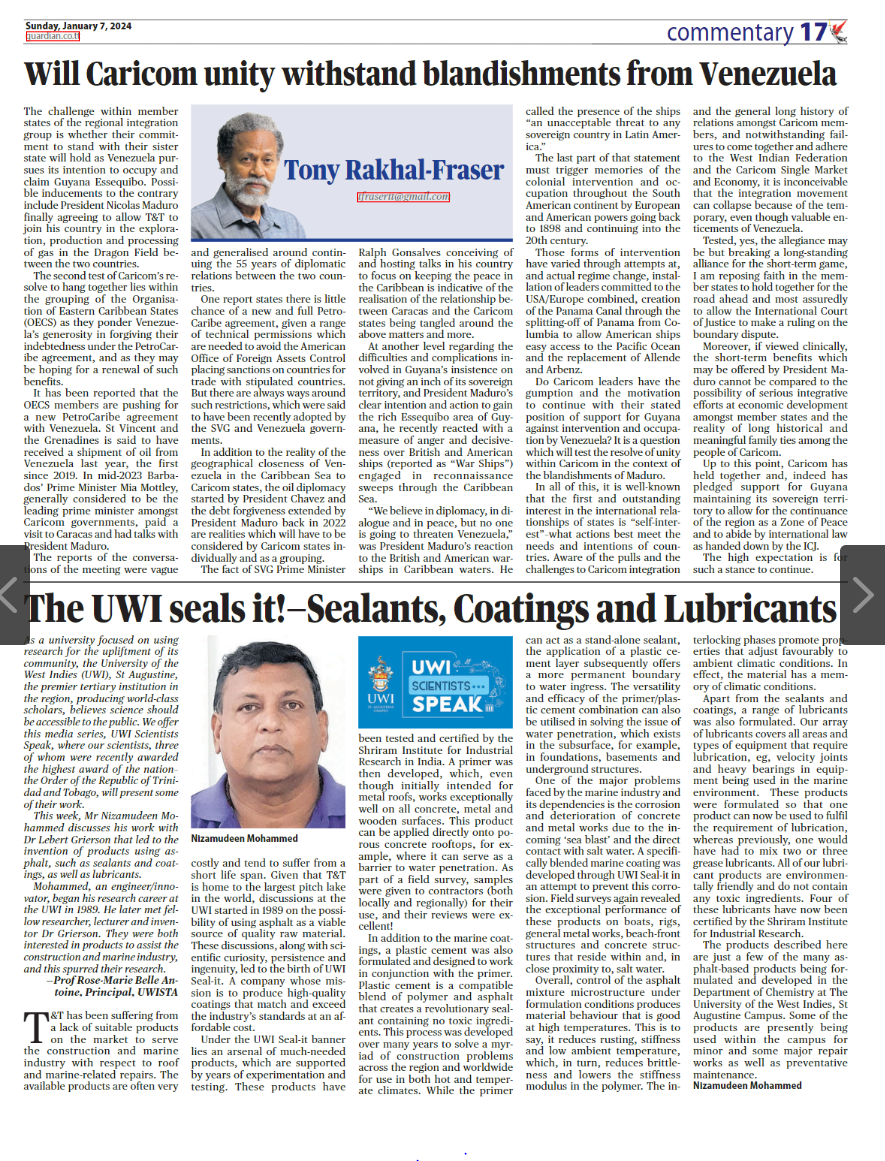The UWI seals it!— Sealants, Coatings and Lubricants
By Nizamudden Mohammed
As a university focused on using research for the
upliftment of its community, the University of
the West Indies (UWI), St Augustine, the premier
tertiary institution in the region, producing
world-class scholars, believes science should be
accessible to the public. We offer this media
series, UWI Scientists Speak, where our
scientists, three of whom were recently awarded
the highest award of the nation– the Order of the
Republic of Trinidad and Tobago, will present
some of their work.
This week, Mr Nizamudeen Mohammed discusses
his work with Dr Lebert Grierson that led to the
invention of products using asphalt, such as
sealants and coatings, as well as lubricants.
Mohammed, an engineer/innovator, began his
research career at the UWI in 1989. He later met
fellow researcher, lecturer and inventor Dr
Grierson. They were both interested in products
to assist the construction and marine industry,
and this spurred their research.
—Prof Rose-Marie Belle Antoine, Principal,
UWISTA
T &T has been suffering from a lack of suitable
products on the market to serve the construction
and marine industry with respect to roof and
marine-related repairs. The available products
are often very costly and tend to suffer from a
short life span. Given that T&T is home to the
largest pitch lake in the world, discussions at the
UWI started in 1989 on the possibility of using
asphalt as a viable source of quality raw material.
These discussions, along with scientific curiosity,
persistence and ingenuity, led to the birth of UWI
Seal-it. A company whose mission is to produce
high-quality coatings that match and exceed the
industry’s standards at an affordable cost.
Under the UWI Seal-it banner lies an arsenal of
much-needed products, which are supported by
years of experimentation and testing. These
products have been tested and certified by the
Shriram Institute for Industrial Research in India.
A primer was then developed, which, even
though initially intended for metal roofs, works
exceptionally well on all concrete, metal and
wooden surfaces. This product can be applied
directly onto porous concrete rooftops, for
example, where it can serve as a barrier to water
penetration. As part of a field survey, samples
were given to contractors (both locally and
regionally) for their use, and their reviews were
excellent!
In addition to the marine coatings, a plastic
cement was also formulated and designed to
work in conjunction with the primer.
Plastic cement is a compatible blend of polymer
and asphalt that creates a revolutionary sealant
containing no toxic ingredients.
This process was developed over many years to
solve a myriad of construction problems across
the region and worldwide for use in both hot and
temperate climates. While the primer can act as a
stand-alone sealant, the application of a plastic
cement layer subsequently offers a more
permanent boundary to water ingress. The
versatility and efficacy of the primer/plastic
cement combination can also be utilised in
solving the issue of water penetration, which
exists in the subsurface, for example, in
foundations, basements and underground
structures.
One of the major problems faced by the marine
industry and its dependencies is the corrosion
and deterioration of concrete and metal works
due to the incoming ‘sea blast’ and the direct
contact with salt water. A specifically blended
marine coating was developed through UWI Sealit in an attempt to prevent this corrosion.
Field surveys again revealed the exceptional
performance of these products on boats, rigs,
general metal works, beach-front structures and
concrete structures that reside within and, in
close proximity to, salt water.
Overall, control of the asphalt mixture
microstructure under formulation conditions
produces material behaviour that is good at high
temperatures. This is to say, it reduces rusting,
stiffness and low ambient temperature, which, in
turn, reduces brittleness and lowers the stiffness
modulus in the polymer. The interlocking phases
promote properties that adjust favourably to
ambient climatic conditions. In effect, the
material has a memory of climatic conditions.
Apart from the sealants and coatings, a range of
lubricants was also formulated. Our array of
lubricants covers all areas and types of
equipment that require lubrication, eg, velocity
joints and heavy bearings in equipment being
used in the marine environment. These products
were formulated so that one product can now be
used to fulfil the requirement of lubrication,
whereas previously, one would have had to mix
two or three grease lubricants. All of our
lubricant products are environmentally friendly
and do not contain any toxic ingredients. Four of
these lubricants have now been certified by the
Shriram Institute for Industrial Research.
The products described here are just a few of the
many asphalt-based products being formulated
and developed in the Department of Chemistry at
The University of the West Indies, St Augustine
Campus. Some of the products are presently
being used within the campus for minor and
some major repair works as well as preventative
maintenance.

